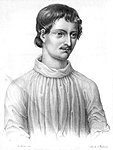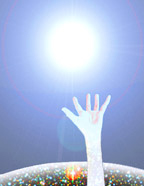Giordano Bruno

The Italian Philosopher Giordano
Bruno was sixteen years older than Galileo. Bruno primarily taught the
skill of memory but also espoused all throughout Europe the doctrine that
there are an infinite number of other worlds. In 1584 Giordano wrote a
thesis entitled "On the Infinite Universe and Worlds." Bruno argued that
if a person believes it logical that even one other world likely exists,
that it reasonably follows that all other worlds exist. Giordano writes:
We are not
compelled to define a number, we who say that there is an infinite number
of worlds; there no distinction exists of odd or even, since these are
differences of number, not of the innumerable. Nor can I think there have
ever been philosophers who, in positing several worlds, did not posit them
also as infinite: for would not reason, which demands something further
beyond this sensible world, so also outside of and beyond whatever number
of worlds is assumed, assume again another and another?
Bruno's conception of infinities is
not like that of Georges Cantor, the mathematician. Bruno described equal
infinities within other infinities:
Whatever is
an element of the infinite must be infinite also; hence both Earths and
Suns are infinite in number. But the infinity of the former, is not greater
than of the latter; nor where all are inhabited, are the inhabitants in
greater proportion to the infinite than the stars themselves.
His writings clearly portray a strong
sense of a unity to being and eternity, or infinite time, as he writes:
Everywhere
is one soul, one spirit of the world, wholly in the whole and in every
part of it, as we find in our lesser world also. This soul...produces all
things everywhere; so that for the generations of some even time is not
required...
And we find in Bruno's writings that
his view of a holistic infinite universe was intertwined with his belief
and view of one perfect God.
Therefore the
perfect, absolutely and in itself, is one, infinite, which cannot be greater
or better, and than which nothing can be greater or better. This is one,
everywhere, the only God, universal nature, of which nothing can be a perfect
image or reflection, but the infinite.
However, Bruno's moving faith in a unity
of God and nature did not save him from the ecclesiastic members of the
Christian Catholic inquisition, who considered his beautiful vision to be heresy.
In 1591 Bruno returned home to Italy where a man named Mocenigo made accusations
of heresy that brought Bruno to the attention of the inquisition. He was imprisoned for
over six years
in Rome and then brutally burned to death early in the year 1600, after
repeatedly refusing to recant his beliefs. It was perhaps the most gross crime
ever committed in order to limit the definition of reality. However, it
may be that such crimes, and the fortitude of Giordano,
wizened
and forged
the resolve of men like Galileo who would weaken the power of the inquisition,
eventually leading to a new
light of human understanding shined by scientific discovery.

Everything
Forever; Learning to See and Model All Possible Universes
Back to Infinity's Past: People
Page
|